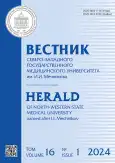Surgical tactics for Crohn’s disease complicated by intestinal bleeding
- Authors: Trunin E.M.1, Petrov S.V.1,2, Shchegolev A.I.1,2, Kozobin A.A.1,2, Tatarkin V.V.1, Koshcheev A.V.1,2, Baymakov S.R.3, Tagayev S.B.3, Pulatov M.M.3
-
Affiliations:
- North-Western State Medical University named after I.I. Mechnikov
- City Hospital of the Holy Martyr Elizabeth
- Tashkent State Dental Institute
- Issue: Vol 16, No 1 (2024)
- Pages: 71-77
- Section: Original study article
- Submitted: 30.12.2023
- Accepted: 19.02.2024
- Published: 28.03.2024
- URL: https://journals.eco-vector.com/vszgmu/article/view/625416
- DOI: https://doi.org/10.17816/mechnikov625416
- ID: 625416
Cite item
Abstract
BACKGROUND: The course of Crohn’s disease often leads to complications requiring surgical treatment. One of the most serious complications of Crohn’s disease is intestinal bleeding.
AIM: To determine the most optimal timing and extent of surgical treatment in patients with Crohn’s disease complicated by intestinal bleeding when conservative therapy is ineffective.
MATERIALS AND METHODS: The article presents the experience of treating patients with Crohn’s disease complicated by intestinal bleeding at the Center for Gastroenterology and Oncopreventology of the Elizabeth Hospital (Russia) and the Republican Scientific Center of Coloproctology (Uzbekistan).
RESULTS: Despite the possibilities of conservative treatment, in 33% of cases the therapy was ineffective and required urgent surgical intervention. The degree of intervention was selected individually based on multivariate analysis.
CONCLUSIONS: Intestinal bleeding is a life-threatening complication of Crohn’s disease, causing the need for surgical intervention in almost a third of cases. Crohn’s disease is characterized by various damage to the gastrointestinal tract, which require multiple options for resective surgery on the small and large intestines, as well as an individual approach to the degree of intervention. The use of modern methods of complex conservative therapy for Crohn’s disease can reduce the risk of complications and reduce the amount of surgical intervention.
Full Text
About the authors
Evgeniy M. Trunin
North-Western State Medical University named after I.I. Mechnikov
Email: Evgeniy.Trunin@szgmu.ru
ORCID iD: 0000-0002-2452-0321
SPIN-code: 5903-0288
MD, Dr. Sci. (Med.), Professor
Russian Federation, Saint PetersburgSergey V. Petrov
North-Western State Medical University named after I.I. Mechnikov; City Hospital of the Holy Martyr Elizabeth
Email: petrovsv@eliz-spb.ru
ORCID iD: 0009-0006-5578-3913
SPIN-code: 8151-2024
MD, Dr. Sci. (Med.), Professor
Russian Federation, 41 Kirochnaya St., Saint Petersburg, 191015; Saint PetersburgAndrey I. Shchegolev
North-Western State Medical University named after I.I. Mechnikov; City Hospital of the Holy Martyr Elizabeth
Email: cionic@yandex.ru
ORCID iD: 0000-0003-1563-2126
MD, Cand. Sci. (Med.)
Russian Federation, 41 Kirochnaya St., Saint Petersburg, 191015; Saint PetersburgAleksandr A. Kozobin
North-Western State Medical University named after I.I. Mechnikov; City Hospital of the Holy Martyr Elizabeth
Email: akozobin@mail.ru
ORCID iD: 0000-0003-1527-3848
MD, Cand. Sci. (Med.)
Russian Federation, 41 Kirochnaya St., Saint Petersburg, 191015; Saint PetersburgVladislav V. Tatarkin
North-Western State Medical University named after I.I. Mechnikov
Email: Vladislav.Tatarkin@szgmu.ru
ORCID iD: 0000-0002-9599-3935
MD, Cand. Sci. (Med.)
Russian Federation, Saint PetersburgAnton V. Koshcheev
North-Western State Medical University named after I.I. Mechnikov; City Hospital of the Holy Martyr Elizabeth
Author for correspondence.
Email: kosheev70@yandex.ru
ORCID iD: 0000-0003-1803-5298
MD, Cand. Sci. (Med.)
Russian Federation, 41 Kirochnaya St., Saint Petersburg, 191015; Saint PetersburgSayfiddin R. Baymakov
Tashkent State Dental Institute
Email: bsayfiddin@yahoo.com
ORCID iD: 0000-0003-1096-835X
MD, Dr. Sci. (Med.), Professor
Uzbekistan, TashkentSherkabul B. Tagayev
Tashkent State Dental Institute
Email: tagayev.66@mail.ru
ORCID iD: 0009-0004-7661-9253
MD, Dr. Sci. (Med.), Assistant Professor
Uzbekistan, TashkentMirkhokim M. Pulatov
Tashkent State Dental Institute
Email: mir181164@gmail.com
ORCID iD: 0000-0001-6767-7241
MD, Cand. Sci. (Med.), Assistant Professor
Uzbekistan, TashkentReferences
- Sandborn WJ, Feagan BG, Hanauer SB, et al. A review of activity indices and efficacy endpoints for clinical trials of medical therapy in adults with Crohn’s disease. Gastroenterology. 2002;122:512–530. doi: 10.1053/gast.2002.31072
- Ivashkin VT, Shelygin YuA, Baranskaya YeK, et al. Diagnosis and treatment of the irritable bowel syndrome: clinical guidelines of the Russian gastroenterological association and Russian association of coloproctology. Russian Journal of Gastroenterology, Hepatology, Coloproctology. 2017;27(5):76–93. EDN: ZHQRZJ doi: 10.22416/1382-4376-2017-27-5-76-93
- Ng SC, Kamm MA. Management of postoperative Crohn’s disease. Am J Gastroenterol. 2008;103(4):1029–1035. doi: 10.1111/j.1572-0241.2008.01795.x
- Vorob’ev GI, Khalif IL. Nonspecific inflammatory bowel diseases. Moscow: Miklosh; 2008. 424 p. (In Russ.)
- Kim KJ, Han BJ, Yang SK, et al. Risk factors and outcome of acute severe lower gastrointestinal bleeding in Crohn’s disease. Dig Liver Dis. 2012;44(9):723–728. doi: 10.1016/j.dld.2012.03.010
- Strong S, Steele SR, Boutrous M, et al. Clinical Practice Guideline for the Surgical Management of Crohn’s disease. Dis Colon Rectum. 2015;58(11):1021–1036. doi: 10.1097/DCR.0000000000000450
- Goldstone RN, Steinhagen RM. Abdominal emergencies in inflammatory bowel disease. Surg Clin North Am. 2019;99(6):1141–1150. doi: 10.1016/j.suc.2019.08.007
- Atroshchenko AO, Kolygin AV, Severova MM, Markushin LI. Crohn’s disease manifested with massive colonic bleeding (review and a clinical case). Koloproktologia. 2021;20(3):84–94. EDN: KCGLQS doi: 10.33878/2073-7556-2021-20-3-84-94
Supplementary files







